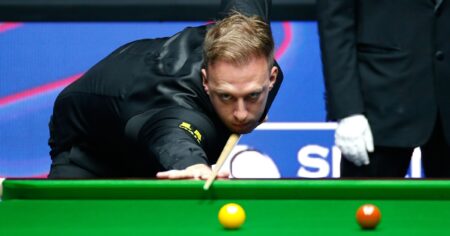Yulia Putintseva faced a significant setback in the first round of Wimbledon as she suffered a crushing defeat to Amanda Anisimova, with a stark scoreline of 0-6, 0-6. The match, held on a relatively obscure Court 15, nestled between the main attractions of No. 1 Court and Centre Court, lasted a mere 44 minutes but was shadowed by an unsettling incident that marred the proceedings. The score alone does not encapsulate the tension that permeated from the stands to the court, significantly impacting Putintseva’s performance throughout the contest.
The match commenced with a relatively routine atmosphere, yet it soon escalated into an episode fraught with concern when Putintseva expressed unease about a spectator’s behavior. During the first set, with the score unfavorably reading 0-3 in favor of Anisimova, Putintseva was heard making an urgent plea to the chair umpire. Her voice projected her apprehension, revealing that she felt threatened by a fan who was allegedly acting inappropriately. “Can you take him out? I am not going to continue playing until he leaves. These people are dangerous; they are crazy,” she articulated, displaying her distress over the matter.
In response to her concerns, the chair umpire acted swiftly by contacting security personnel, recognizing the gravity of the player’s complaint. However, Putintseva’s anxiety did not dissipate at that point; she insisted on the immediate removal of the individual in question with a stark statement: “Take him out because maybe he has a knife.” The explicit nature of her comments highlighted not just a personal concern but mirrored broader issues surrounding safety in sports venues.
The All England Lawn Tennis Club (AELTC) later acknowledged the incident, confirming that they had been alerted about problematic spectator behavior and that proper security protocols were promptly enacted. They stated, “Following a complaint about the behavior of a spectator at the match on court 15, the chair umpire informed security and the matter was dealt with.” This acknowledgment underscores the continued vigilance that organizers must maintain to ensure player safety, especially in light of historical events, including the notorious stabbing of Monica Seles in 1993 during a match.
Despite being ranked No. 33 in the world, Putintseva had previously showcased her ability to compete at a high level, famously reaching the fourth round of Wimbledon the prior year and defeating the then-world No. 1, Iga Swiatek. Such a sudden and comprehensive loss to Anisimova—a match-up that was anticipated to be competitive—rang alarm bells as it suggested that external factors significantly impacted her performance.
Although Putintseva refrained from addressing the press after the match, her opponent Anisimova addressed the situation post-game, assuring fans and the media of her sense of security: “I’m sure we are protected.” Anisimova, now moving forward in the tournament, is scheduled to face Renata Zarazua in the second round.
Security concerns at sporting events, particularly tennis matches, particularly resonate throughout the community. The sentiment was echoed by Sally Bolton, the chief executive of the AELTC, who asserted the importance of maintaining rigorous security protocols to foster an environment in which players can compete confidently. She remarked, “We’re well-versed in the measures that need to be put in place so players can go about playing here in the confidence they’re being well looked after.”
As the tournament progresses, the incident serves as a timely reminder of the challenges that athletes face beyond physical competition—issues of safety and mental focus are paramount in professional sports. While the attention remains on athletic achievements, such incidents inevitably highlight the need for vigilant security and a supportive atmosphere for athletes worldwide. As the Wimbledon championships continue, it will be crucial for officials and organizers to ensure that safety remains a priority, allowing players to perform at their best amidst the pressures of high-stakes competition.












